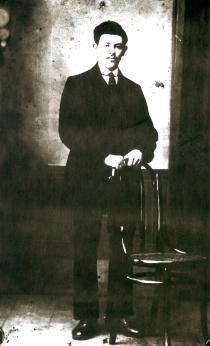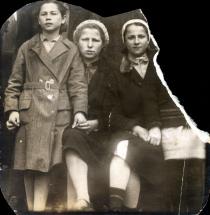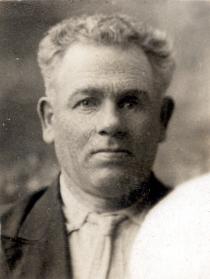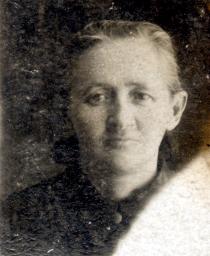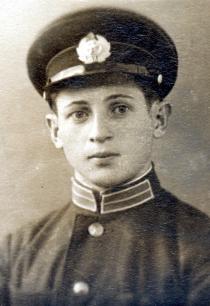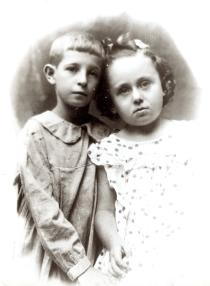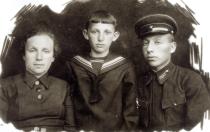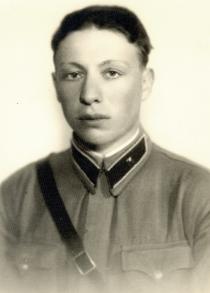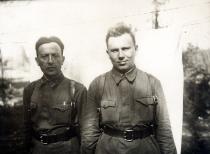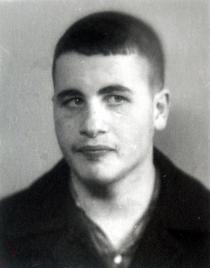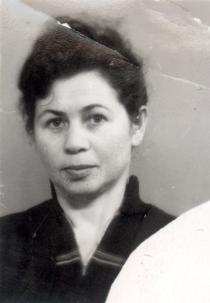
It was not easy to talk to Gisya Rubinchik. She was constantly turning her eyes towards the door of her sick son's room. Thus it was sometimes embarrassing to ask her about details of various events. People like her can be called great martyrs - so many ordeals she had to withstand! A cultured, educated and noble-looking person, at her 83 years of age, she has preserved a tenacious memory, expressive speech, and most importantly, an unusual courage.
I was born in 1919 in the town of Shklov located on the Dnieper river. When I was young there was a magnificent park in this town, second after the one in Minsk in size and beauty. Shklov was a small, green, and very picturesque town. It's famous in Russian history. When it was still a village, Catherine II 1 declared it one of her favorites. Poles lived there, Belarus and a lot of Jews, too. They were generally craftsmen. Everyone lived in peace and friendship. The doors of our house were never locked.
My father's name was Evsei Lapis. Evsei is a Russian alteration of the Jewish name Ieshua. Later, when I received my passport, an illiterate employee of the passport bureau put down my patronymic absolutely wrong: Gamseyevna. My real name is Gisya Evseyevna, but she wrote it down the way she heard it: Gamseyevna. My father came from Shklov. When he was young, he worked with his father in a mill, which stood on the bank of a lake, above the Dnieper river.
My father had three brothers. The eldest was Moisei, and the younger ones were called Abram and Honya. They moved to Petrograd after 1917, when the Pale of Settlement 2 was abolished. He also had three sisters. Fanya was a real beauty. She lived with her husband in Smolensk, and then moved to Lvov. For the first 10 years of their marriage they had no children. Then a daughter, Zoya, was born, who now lives in Germany. My father's youngest sister, Liza, was an active communist. She married one of our relatives. I don't remember what kind of kinship that was, maybe one of her cousins. Then she divorced him, married a Russian guy and left with him for Murmansk, a seaport in the north of Russia. Her second husband, Smirnov Sergei Alexandrovich, was the secretary of the Murmansk regional committee of the Communist Party and supervised personnel allocation in all parts of the region.
The third sister, Haya, lived with us after the death of her husband. When her husband, Vladimir Shur, was still alive, their family lived in the neighboring settlement Kopys on the Dnieper river. Their older son was called Lev. Their second son, Zyama, fell from a swing and struck his head against a stone. I was still small, when he died. Their third child, Mishenka, was born in Shklov, where Aunt Haya moved to get help from her mother, my grandmother Sore-Riva Lapis [nee Shafkid]. Right then Haya's husband, Vladimir, committed suicide. As it became clear later, the reason for this act was nonsense, or better, his kindness. Someone had borrowed 90 rubles of community money from him and hadn't paid back the debt. Vladimir was supposed to report it. He felt such remorse, as if he had embezzled the money, and hung himself. It was such a horror, I remember, when it happened. Haya fell ill after this news, bleeding from her throat. The children and she had found shelter in our house, although it was already rather crowded, because other people lived in the second half.
Unfortunately, I don't remember when exactly my parents were born. My father was born around 1885. I don't know anything about his education. He served in the army from 1914 to 1918, participated in World War I, and then in the Civil War 3. He was a very strong person, strong-willed and brave. He didn't join any party and stayed away from politics. He was awarded a St. George Cross 4 for his service at the front. I remember, we had a photo that showed my mother and my father's sister sitting, and standing behind them were my father and his friend, a Russian, with St. George Crosses on their chests. It was a very rare award for Jews. Father returned from the war as an invalid: he lost a leg and one eye. He was treated in a hospital in Petrograd.
I don't know too much about my mother Maria Gershevna Lapis' family. Here's how I learnt about her difficult childhood. I remember that once I was very offended with my mother for something. I was sulky and angry, and suddenly my grandmother, Genya Orman, the wife of my grandfather Gersh Orman, came to me. My mother was crying in the bedroom: I hadn't been eating or talking for three days in a row. She said to me, 'Okay, let's go over to our place, since you don't listen to your mother and upset her so much!' Without thinking twice I put on my coat and went with her. This all happened in winter. We walked slowly, and she told me that when my mother was only 12 years old, her mother died. My mother was very gifted and wanted to study. She had an inclination to literature and even wrote compositions for her cousin, who was a student in grammar school. But she couldn't continue her education because from the age of 12 she had to do all the work around the house. She even had to step on a bench to light the oven. It was then that grandfather Gersh married the younger sister of his deceased wife: grandmother Genya, who was actually my mother's aunt. And I had thought to that very day that grandmother Genya was my real grandmother. Her story shocked me so much, that I rushed home to apologize to mother. I stood on my knees, promised never to misbehave, and she, certainly, forgave me. I cried all night long, and my parents couldn't understand why. I was very upset.
My father got married soon after he returned from the front. So my mother married an invalid. She was only one year younger than my father. Mother and him loved each other very much and had known each other from childhood, because they were cousins. That means that my grandmothers were sisters. Their father, Ilda Shafkhid, lived to 93, and, as they said, preserved a clear mind, a tenacious memory and all his teeth to his very last days.
We lived with my father's parents. They were deeply religious people, strictly adhering to traditions. My grandfather's name was Yankel Lapis. I remember him praying and reading old books all the time. They were Jewish books, principally the Talmud. Grandmother didn't read books, she did all the housework. Grandfather had a tallit and tefillin, and, of course a kippah. He wasn't a rabbi, but read so much, knew so much about Jewish history, was such a wise and fair person, that 'Yankel Lapis from Shklov' was almost considered a saint by everyone in town! I can't remember any specific case, but people used to come and consult him.
When I studied at school, he even helped me to do my maths homework. He already had a poor vision then and therefore used to put a stool on a table, to be closer to the source of light. And, he read that way, too! He used to tell me stories from the Torah, but by now I have almost forgotten them all. Since I was a pupil in a Soviet school, where we didn't study any religious subjects, my grandfather couldn't study with me. Of course all Jewish traditions were strictly kept and respected in our house. Everything was done exactly in accordance with traditions. The oven wasn't lit on Saturdays - meals were prepared beforehand. And, certainly, all holidays were celebrated, including Pesach, and Sukkot. Grandfather made a sukkah out of fur-tree branches in the kitchen garden and lived there as long as it was necessary. I was a pupil then and remember this very well: He lived there for seven days, slept, ate and prayed there.
We attended the synagogue, too. There were two synagogues in Shklov. One of them was a big, two-storied synagogue. Women were praying separately from men, on the second floor. The other synagogue was one-storied. We went to the small one more often, because it was closer to our home. When I lived in Shklov with my parents, we visited the synagogue every week, and, of course, on major Jewish holidays.
On Fridays my mother used to put a clay pot with coffee and milk into the Russian furnace, and baked cinnamon buns. These buns, I think, were called plekhah. She also baked crackers: cut the dough, sprinkled the slices with sugar and dried them in the oven. Such a tasty thing that was! I took them to school to treat my friends. On Saturdays, after visiting the synagogue, grandfather Gersh usually came to see us. He worked as a forest warden and also lived in Shklov, but in another district.
Both Yiddish and Russian were spoken in the house, but adults mostly spoke Russian with the kids. I spoke some Yiddish with my grandfathers and grandmothers, and sometimes with my parents. I remember Yiddish a little bit; I could write in Yiddish, and I remember the names of the months.
All the housekeeping was done by my mother. She was skilful in everything she did, and besides, she was very quick. The family had a small kitchen garden. At one stage there was even a cow, but later all dairy products had to be purchased at the market. My mother carried heavy buckets and iron pots, and she brought water from three blocks away! She worked day and night. I don't know how she could handle it all. While we lived in the family, my brother and me helped her as much as we could.
Grandfather Yankel's home, where we lived, was a one-storied wooden house, but rather a large one. A part of the house was later taken away from him, when the so-called dispossession of the kulaks 5 began. We lived in terribly poor conditions. Father was an invalid and couldn't earn much. He worked in a company for the handicapped as a cutter of footwear. It was very difficult for him to walk. His artificial leg was of poor quality. He got wounds from wearing it. He was always sick because of these wounds. When I was small, I enjoyed it when father took me in his arms and told me episodes from his military life. Unfortunately, I can't remember any details of his stories any more.
Before my grandfather was deprived of one half of his house, my father's older brother, Uncle Moisei, lived with us. Once his wife, Aunt Brokha, took a large pot of boiling water out of the stove and put it on the big round table, around which I was playing with her daughter Nina. I wasn't even 4 years old, my cousin was even younger. We were running and romping along. And suddenly I missed my trajectory and hit the table, whereupon the pot with boiling water fell onto me. After that I had to spend one and a half years in bed, and had to learn how to walk anew. Probably, this event was the first in a chain of misfortunes that haunted me throughout my life.
Here's one more episode from my early childhood that I remember. It was the day when Lenin died in 1924. I was no more than 5 years old. My cousins Yasha and Boma came running to break the news to us. They were about 10 years old and loved to tease me. They said that Lenin had died. I dressed quickly to run into the street and see what was going on - I thought it had happened in our town. And the boys threw a fur coat over me. I was crying, because they didn't let me attend Lenin's funeral.
My parents, and everybody else, wore very simple clothes. They were no suits or any fashionable clothes. In winter they wore short fur coats, and women wore checkered woolen kerchiefs. Jewish women didn't wear wigs in Russia in the 1930s. Both men and women wore Russian countryside-style clothes: a vest, a shirt and a frock coat. Men didn't wear kippot, only peaked caps. Kippot were only put on in the synagogue. All in all, it was a peasant's outfit. But we [children] were treated and dressed in better clothes.
Our parents also wanted us to get an education, and we tried our best to study well. Up to the 4th grade I went to an elementary school. I even remember, what my first teacher's name was - Evgenia Ignatievna. Later I changed to another school, where I studied up to the 8th grade. And it was in a third school that I finally completed my secondary education, the 10th grade. All schools were Soviet schools. I studied German at school, but I didn't like it. It was an ordinary Soviet school with Komsomol 6 and pioneer organizations. I had very good teachers. My teacher of chemistry was Irina Antonovna. She was so graceful, swarthy and slim - I liked her very much. Therefore I took a great interest in chemistry. Later, in Leningrad, at a conference in the Institute of Experimental Medicine, where I worked after graduating from the Medical Institute, I met her again. She had quit teaching and was studying to be a pathophysiologist. We became colleagues.
My brother, Yuda, was born on 8th March 1921. He didn't go to cheder, because there were no more cheders after the Revolution of 1917. He studied in an ordinary Soviet school like me, with kids of various nationalities: Poles, Russians and Jews. I also had a sister, Sonya. She was born in 1930 and a small, thin, fair, and blue-eyed girl - that's the way I remembered her all my life. My mother had such a hard time with them! They were very often sick, their teeth grew slowly, and they even fainted sometimes.
Mother told us that they had once given shelter to refugees from Latvia. It was a woman and her three daughters who had fled from the Germans, when they seized Riga in 1917, and settled in Shklov. My mother taught them Russian. She didn't speak German. When they returned to Western Latvia they lived in the town of Tukum. After they left, they kept sending letters to each other for a long time. And they didn't forget to put a ribbon or a handkerchief into the envelopes. When one of the daughters got married, they even sent mother an invitation to the wedding party, with a golden stamping. But my mother couldn't really leave her home for such a trip. And when, at the beginning of 1930s, a terrible famine struck Belarus, they used to send us parcels with products: butter in blocks, as large as bricks, and even cereal. I remember how I inscribed their address in German on large envelopes with small mica windows.
Our neighbors were people like us, very simple people. I remember some old ladies coming and asking mother to write a letter in Russian. And she never declined. I had a friend, Raya Dankevich. Her father was Belarus, and her mother was Polish. They were probably against our friendship, but never showed it. Later, during the war, as I was told, they became betrayers and cooperated with the Nazis. But as kids, Raya and me often ran to visit each other through our adjacent kitchen gardens. Her brother, Senya, was my brother's classmate and even tried to court me - by putting a line in my copybook or giving me a note every now and then. We often frolicked in their house. Their mother, Sophia Alexandrovna, was a very strict woman, and even made her children kneel down and beat them with a rope for mistakes they had made. As to us - we weren't ever beaten by anybody of our family.
Nobody ever paid any attention to people's nationalities at school. We made friends, fell in love. My first love was called Vladimir. He was fair- haired, brown-eyed, from a Belarus family. He joined our class in the 10th grade and was a big troublemaker. I frequently fought with him. I was rowdy and always talked back to anyone. I remember a school party in the 10th grade. We were reciting poems. When somebody read verses, I always had tears in my eyes. After the party we had a discussion about who was reading what at the time. I said that I was reading a novel by Balzac, Splendeurs et misères des courtisanes [English title: A Harlot High and Low]. It turned out that Vladimir was reading the same book. And he called me by the name of one of the heroines - Esther. This is how our love affair began.
From my childhood on I was a romantic person, taking great interest in literature and poetry. And I still like to draw, mainly portraits. Even now, that I can hardly see any more, my hand reaches out for paper. I was fond of walking in the forest and always had my head in the clouds. My husband used to joke that he brought me down from the heavens onto the earth.
My brother loved to read, too, we had a lot of Russian books at home - purchased or borrowed from the library. We used to read even late at night. I wrote very good compositions. The director of our school always read my compositions out loud to the other children. I had beautiful handwriting, too.
I lived in Shklov until 1937. After leaving school I went to Smolensk to enter the Medical Institute. I went there with my friend Raya, though my mother advised me to pursue drawing. I studied for two and a half years in Smolensk. Then my parents decided that it was better for me to live closer to my brother, who was a student at the Leningrad Aircraft Institute by then. So in the winter of 1940 I found myself in Leningrad, and continued as a student of the 1st year at the Medical Institute.
It was in Leningrad that I saw my father for the last time. He came to visit my brother Yuda, me, and his brothers, Abram and Honya. It was the first vacation in my father's whole life. For the first time he had a rest from his work, from his household chores. Before he left, my father and I went on a ride in a tram. When the tram turned from Kuibyshev Street to the Revolution Square, I suddenly felt my heart stand still due to a bad presentiment. I felt as though I was seeing my father for the last time. I was almost choking from tears, something was squeezing my throat and chest. I could do nothing, and neither could I explain my condition to my father. That happened in the spring of 1941. There were only a few months left before the beginning of the Great Patriotic War 7.
When the war began, I lived in a student hostel in Leo Tolstoy Square, and my brother was staying in a hostel in Moskovsky Avenue. Soon we had to move to other places. The war turned our lives upside down. All students were ordered to take part in defense preparations. We [medical students] dug trenches near Kingisepp. When we were unloading heavy beams, one of them fell down on me, injuring my hip joint. Since that accident I have had trouble walking. When we returned from trench works, we were commissioned to night and day shifts in a hospital in the old center of Leningrad. In the meanwhile, lectures in the Medical Institute continued. A marine hospital was arranged in our hostel facilities. We had to move over to Petrovskaya Embankment. Later that building was hit by a German bomb, and we were left homeless.
In the beginning my brother took part in defense work in Moskovsky Avenue. The front line was very close to the hostel of the Aircraft Institute, and they built anti-tank obstacles. The hostel was in the zone of artillery bombardment, and my brother moved over to the flat of Uncle Abram, in the center of Leningrad. Uncle Abram was at the front, and his family in evacuation. The apartment was occupied by their relative, Aunt Rose, and her adopted son, Yasha. The first winter of the blockade 8, 1941-1942, was the most awful one. The temperature fell to 30 degrees Celsius below zero. People were starving. My brother was could not work any more. But Aunt Rose made the poor boys take out the slops and carry water to the third floor. They had to live one way or another! My brother was weaker than me, he had been suffered from a liver disease since his childhood. I supported him as much as I could.
After shifts in the hospital and lectures at the Institute, I used to walk a long way through the city in the nipping frost, and brought my relatives bread. When Aunt Rose died, and Yasha followed her shortly after, Yuda gave himself up to despair completely. Each time I came, he said, that I would be burying him on my next visit. I remember him lying there, unable to get up any more, wasting away in front of my eyes, and I tried to convince him, 'Come on, Yuda, brace yourself up, this nightmare will be over soon'. But on 14th March 1942 I found him dead. A few days before, on 8th March, he had turned 21. I buried him myself.
My sister Sonya, who had only turned 11 at the outbreak of war, remained in Shklov with our parents. At the beginning of the war I lost contact with them. I still have my mother's last letter from 27th June 1941. She wrote, 'Maybe we can survive this thunder-storm, as we did in 1918...'. She couldn't imagine what would happen to them, what vile atrocities the Germans would commit. They were all buried alive in Shklov, in the mound between the lake and the Dnieper River, in the very same place, where the mill once stood, where my father and grandfather worked. [This was the famed Shklov killings.] 9 For three days the ground was stirring on that spot, and groans of people were heard from under the ground. All my relatives were murdered there: my mother, father, both grandfathers, both grandmothers, my sister Sonya, Aunt Haya and her son Misha; and, thousands of other Jews. I didn't know about it back then. After the war I wrote many letters to official bodies in Minsk and many other places. I was searching for exact information, but it was in vain. I got no answer whatsoever. Later I learned everything about this tragedy from eyewitnesses.
I studied and worked throughout the war, from 21st July 1941 to 29th March 1944. But I had to interrupt my studies, because I was physically unable to attend lectures. I worked as a nurse in the hospital of the First Medical Institute then.
I received my diploma in 1946. After graduation I was directed to work in the House of Sanitary Education. When I came there, the managers were surprised. They didn't need practical doctors. So I was told to look for another job myself. I found one with the Institute of Experimental Medicine without any patronage and despite my nationality. There was no anti- Semitism yet. The only thing I was concerned about was my lack of experience. I remember walking down the corridor looking for the director's office. The director asked me what I was interested in. I said that I liked chemistry and knew how to draw. 'OK,' he remarked, 'we need someone who can work with the microscope and draw in the Histology Department.' But actually there was a vacancy only in the Department of General Comparative Morphology, headed by professor Nasonov. And my chief, Michael Abramovich Brown, was a wonderful man. Following the reorganization of the Institute I was transferred to the Department of General Pathology. I worked there for almost 30 years until my retirement. I had no time to defend my candidate's thesis due to family circumstances, but I passed the exams all right.
I have to say that my colleagues treated me well. I didn't feel any humiliation. Even in the most gruesome times, during the so-called Doctors' Plot 10. We, just like employees of other Soviet establishments, constantly had political training: we studied Marxism-Leninism, Stalin's works and historical materialism. We were permanently engaged in all sorts of political seminars and meetings. I was often appointed secretary at these meetings because of my nice handwriting. I remember how we condemned the 'poisoning doctors' in our Institute. And everyone believed it was true, including me. The paradox of the Soviet regime consisted in the fact that people were made to believe the most improbable things and even renounce their relatives. This is what one can call mass foolishness.
I'll tell about one particular case. My mother's elder brother, Lev, was married to a Russian woman, a physiatrician called Anna Sergeyevna Plotkina. They had two daughters, Inna and Rita. They lived in Volgograd. They lived very well, but when this case against doctors began, Uncle Lev's wife kicked him out. He came to Leningrad to stay with us and his older daughter. I was already married then and had an invalid son. Uncle Lev remained with us, until he settled in his own flat.
I got married in 1945. We had no wedding celebration at all. What kind of a wedding party would it have been anyway, in 1945, after everything that we had gone through?! I got acquainted with my husband, Pavel Abramovich Rubinchik, a Jew, at a friend's home. He came from Bryansk region, from the settlement of Zhukovka. He was an engineer, fought at the Leningrad front and was wounded. His wife was evacuated to Kuibyshev during the war, fell in love with another man there and left Pavel. After the war he worked as chief engineer at a Leningrad factory called Weaver.
My husband was 13 years older than me, he had two daughters from his first marriage, and he missed them a lot. His first wife wrote that she couldn't cope with the older daughter, and that he should take her into his new family. He persuaded me. I agreed and cried because of her behavior every other day. His daughter was very spiteful, disliked me and was jealous of her father.
We lived in a communal apartment 11, two rooms were occupied by my husband's relatives. Then we moved to another flat. Our son, Misha, was born in 1947. The delivery was terrible. My son was born disabled. From that moment my excruciating torment began. I corresponded with Academician Filatov 12 and addressed other prominent medical specialists, but my son remained completely helpless. He sees nothing, hears nothing and cannot speak. And he had a bulk of other diseases. How horrible it was in a shared flat with the ill child! How our neighbor scoffed at us! It was another, terrible blow to me when my husband died in 1968. I buried him in the Jewish cemetery.
I moved to another flat with my son after the death of my husband. Some people helped me. The flat was hard to obtain. So many doors I had to knock at: the district party committee, the city department of national healthcare, and so on. I had to go through many hardships.
I haven't left my home for as long as three years now, because of my illness. I'm almost blind. But when I think back of everything that I lived through, I consider myself a happy person. God saved my life, while all my folks were buried alive. Nothing remained of them, just a few photos survived by miracle.
I did not lead a religious life. We only had atheism and the Soviet political propaganda before the war, when I was a student, and even after the war. I was a scientific worker and thus didn't need to be a member of the Communist Party. Luckily, I didn't experience any anti-Semitism or political repressions. I don't really know what's going on elsewhere in the world, even in Israel, because I'm completely preoccupied with the health of my sick son and my own. I regularly get various kind of support from Hesed, and I appreciate it a lot.
